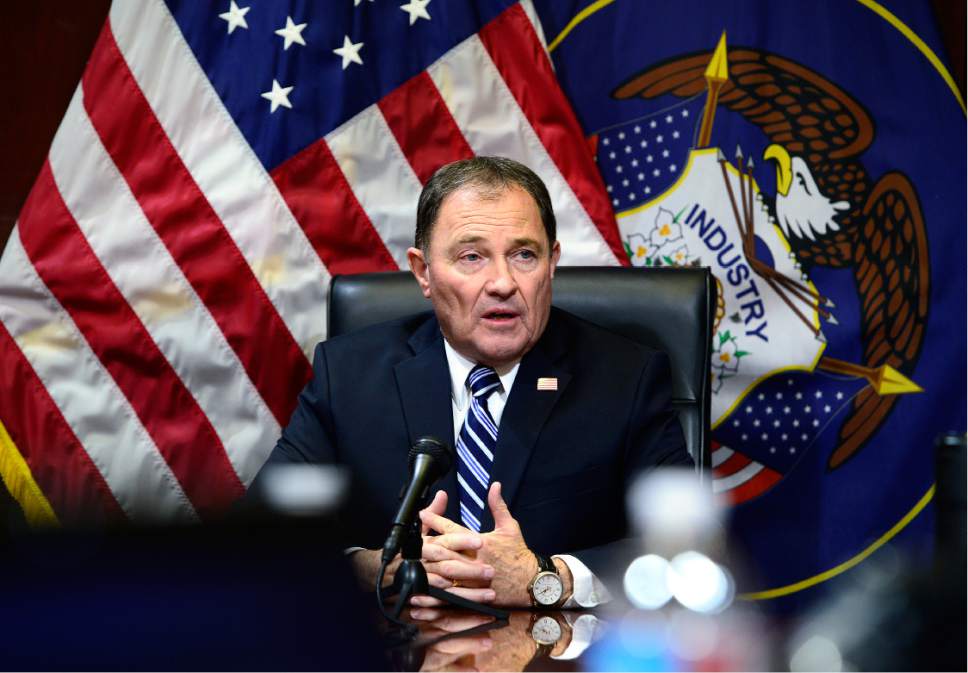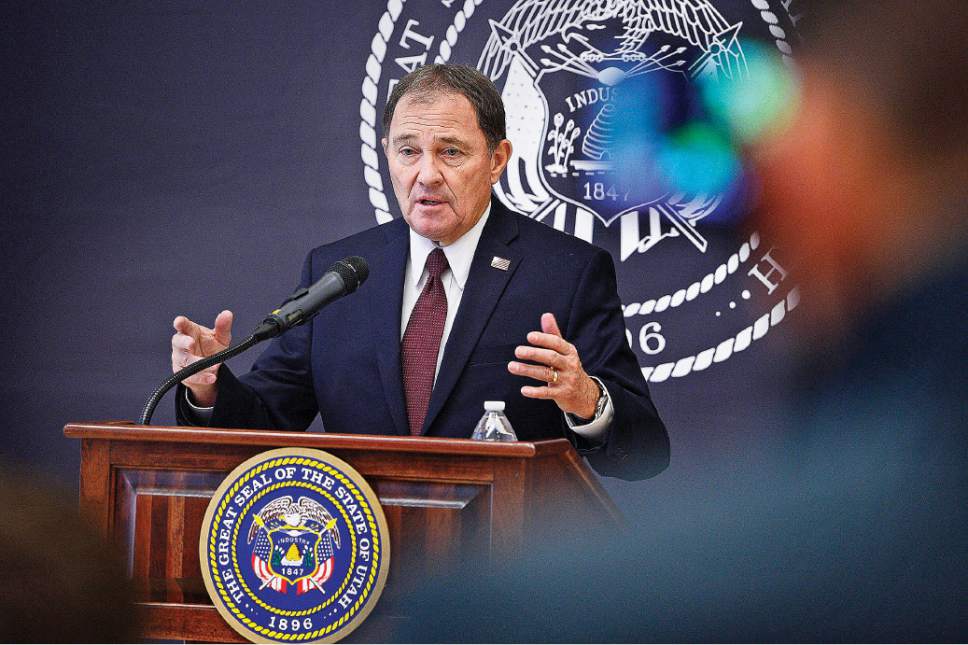This is an archived article that was published on sltrib.com in 2017, and information in the article may be outdated. It is provided only for personal research purposes and may not be reprinted.
Amid daily protests and court battles over President Donald Trump's refugee and immigration orders, Gov. Gary Herbert says Utah may have a special role to play nationally to show how to reduce the tension and resolve the issue.
Utah demonstrates how to perform some extra vetting of new arrivals, he said, while also making them feel welcome by providing help to learn English, gain skills and find jobs.
"It's one of many ways that I think Utah is becoming what I call the gold standard, one that other states are trying to emulate," Herbert said in an interview with The Salt Lake Tribune.
"We do have a unique position and a unique perspective because of our history and culture," he said. That's because the state was founded by Mormon refugees fleeing persecution. It also has many modern refugees and immigrants.
"We are a very diverse state. We speak 140 languages. We have people who come from all over the world to live here. We have people we have exported all over the world [through] the Mormon missionary program. Those things combine to make us a little unique. I think that uniqueness is what is leading to our successes" in many areas.
Herbert — and the heavily Republican state — have attracted some national attention for breaking ranks a bit over refugees with GOP President Donald Trump. CNN asked Herbert about that this week, and he explained that Utahns may have more empathy for refugees because of their culture and history.
He also told The Tribune that other events in Mormon history lead Utahns to be especially wary of religious persecution. For example, "We had [U.S. President] Rutherford B. Hayes in 1879 issue an envoy to Europe saying in essence, 'Don't send those Mormon immigrants to America anymore.' "
As building a wall with Mexico or limiting refugees were hot political topics over the past year, Herbert sent some messages that immigrants and refugees are welcome and important to Utah.
That included declining to join other GOP governors who said they would refuse Syrian refugees after the Paris bombings.
At his inaugural last month, Herbert made a point of involving two refugees. One from Sudan led the Pledge of Allegiance. The other said the closing prayer, and may not have been as obvious to attendees as being a refugee.
"It was President [Dieter] Uchtdorf," of the First Presidency of The Church of Jesus Christ of Latter-day Saints, Herbert said. He "talks about his own refugee [experience]," when he left East Germany as a child.
"I hope that sent some kind of a message that we are a welcoming state," he said.
"That being said, let me say I recognize that the first role of government is to keep us safe. So we have put together our own vetting program," the governor said.
He explained that Utah has two State Bureau of Investigation officers who do extra vetting of refugees who come here.
"We work with the administration so we know who comes into the state, and we greet them. We ask to find out about their background as sort of a second bite of the apple to just kind of review where they come from," he said
But at the same time, they offer help. "They say, 'Here is a refugee center. We're going to teach you to speak English. We're going to give you an education so you can develop skills and talents to go out there and get a job and integrate into our system, become a productive member of society.' It is a good way to do things."
Herbert said Trump may have had similar goals, but communicated his reasons poorly and failed to secure buy-in before proceeding.
"I just don't think he built enough of a coalition where people understood what he was trying to do," Herbert said.
Despite that, Herbert defends the goals of what he sees Trump attempting — if not his specific methods and explanations.
"Mr. Trump, I think, is on solid footing on what he is trying to do in having an executive order to say let's review the vetting process," Herbert said.
"I don't know what has prompted him [from intelligence briefings] to do what he is doing, but I do know the seven countries have been identified as exporting terrorism. Those are the same seven countries that [President Barack] Obama identified too. Countries that have more Muslims are not on the list, so it's not just a Muslim ban."
The Trump order, however, includes exceptions for people who are members of a minority religion in those seven Islamic countries and suffer persecution because of it — part of the reason it is viewed by many as targeting Muslims, along with campaign rhetoric Trump used about imposing a Muslim ban.
Herbert said better communication about reasons for the immigration and refugee restrictions, and a more welcoming attitude, are needed.
The governor said perhaps the administration should look to Utah. "We are a kind, generous people in Utah. We are welcoming. I think we need to continue to do that."





